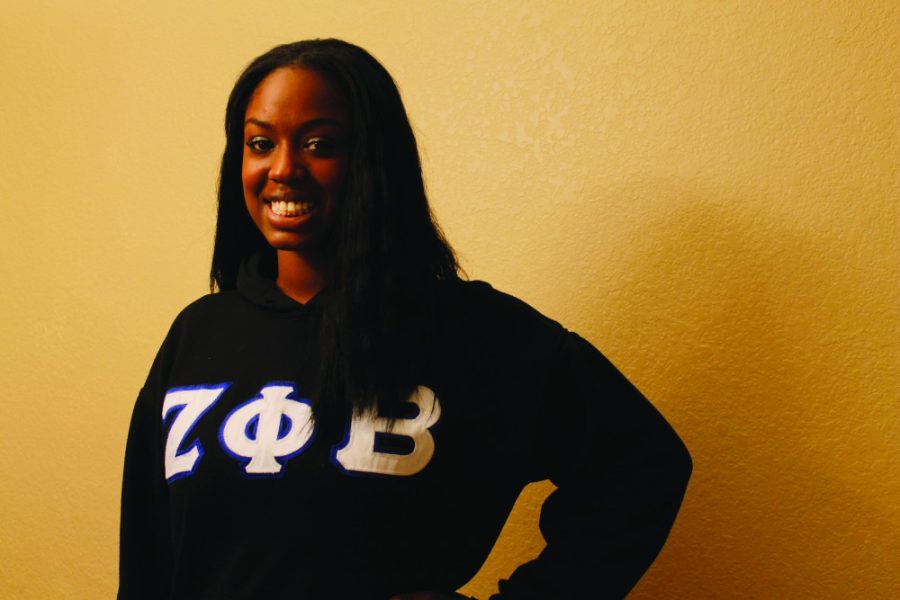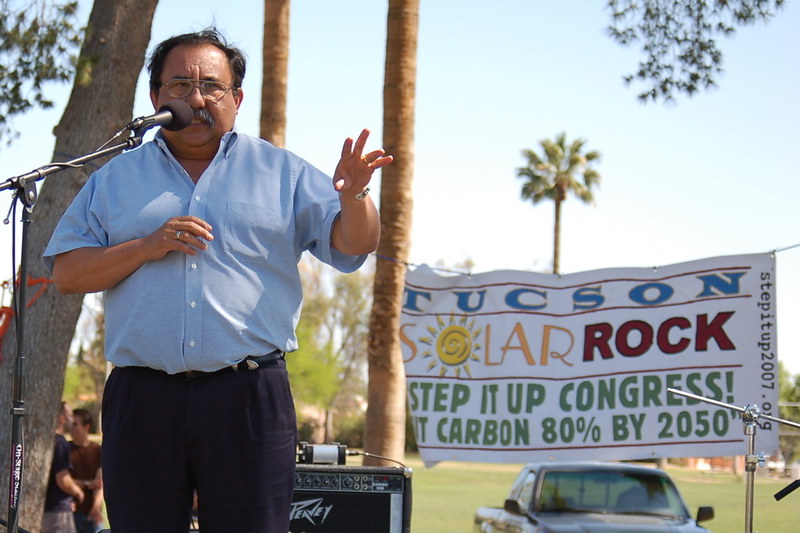Nita Ocansey left her hometown of Phoenix for the UA with one lesson from her parents in mind: Take initiative. Seven semesters later, Ocansey is a nutritional sciences senior, the president of her chapter of Zeta Phi Beta Sorority, Inc., and the former vice president of the National Pan-Hellenic Council, a collaborative organization that houses the “Divine Nine” African American sororities and fraternities. She is also a member of the Rising Star Baptist church.
Ocansey attended a predominantly white high school and expected to have a similar college experience, she said. However, after becoming involved in various organizations through the Dr. Martin Luther King Jr. Student Center, including African American Student Affairs, the African Student Association and Maximum Education Results in Two Semesters-360 Scholars, she gained an entirely new outlook.
“The classes and people on this campus really opened my eyes to seeing this world as a whole different place, and with that, I found my niche and saw that I identified better with people who looked like me,” Ocansey said. “It was just really nice to feel connected with students who shared some of the same goals and experiences.”
As Martin Luther King Jr. Day approaches, Ocansey sees it as a time to celebrate her own growth and accomplishments, as well the societal contributions from great leaders of our time. However, she finds the events on campus underwhelming.
“In all honesty, I think the school could do better. The programs at the MLK Center try to do what they can, but I believe the university doesn’t take as much pride in that of the African-American culture,” Ocansey said. “It’s sad enough that it took so long for this day to be recognized nationally. It is time for individuals to come together and really recollect the work that was put forward by so many other great leaders, including multicultural leaders in addition to Martin Luther King Jr., and to really celebrate the culture of African-Americans and other groups.”
The UA has been involved in a variety of celebrations since the early 1990s, said Melissa Vito, vice president for Student Affairs. The university also offers resources for black students on campus, she added.
“The University of Arizona has a number of support services for all students and many of our African American students use them,” Vito said in an email interview. “In addition, the African American Cultural Center helps provide support and a sense of connection for our students. Clearly the work that Martin Luther King Jr. impacted society in many ways. How people choose to honor this varies, but his reach transcends ethnic boundaries.”
Interim Dean of Students Kendal Washington White, who has been an employee of the UA since 1993, said King’s birthday, and more importantly, his ideals, have been celebrated every year. When she first arrived on campus, the university sponsored a celebration on the UA Mall in an effort to engage the campus community, she said.
Organizations such as African Americans in the Life Sciences, the National Society of Black Engineers and Greek letter organizations provide African American students the opportunity to engage in campus activities and help create a pattern of enrichment that extends beyond just one holiday. According to White, the university’s faculty has also secured federal grants to increase African-Americans’ and other ethnic groups’ participation in particular career fields.
White also shared her opinion on the importance of the holiday.
“I am a person who believes in both symbols and substance. The fact that most municipalities in our nation moved towards making the Rev. Dr. Martin Luther King Jr.’s birthday an official and observed holiday is a tremendous symbol of the critical nature of his work and how he championed the nation’s ideology regarding the rights of all people via civil disobedience,” White said. “Each of us has a voice, and are hopefully passionate about human rights issues today.”
Over time, White has noticed changes in how MLK events are handled on campus.
“Over the years, there has been a shift from the responsibility of the MLK celebration to rest with the African American Student Affairs office to inviting the campus community to develop creative, discipline-specific programming to be included in a comprehensive calendar of events that would appeal to our diverse campus community,” White said.
This semester AASA organized five events in honor of Martin Luther King, Jr. Day, the first of which kicked off on Monday and the last taking place on Sunday. However, some of those involved with AASA feel university members have not done enough to get involved.
“The university as a whole hasn’t really made a personal investment in the process of celebrating MLK’s legacy,” said Charles Davis, community facilitator for AASA. “Arizona was the last, or one of the last, states to acknowledge it as a national holiday, and I think the university played into that same sort of politics of not having to do it.”
Davis suggested that the UA have a diverse committee of stakeholders who come to the table with ideas and ways to celebrate the legacy, resulting in a full week of events that would reach the entire UA community. A system like this would mean that more officials than just those in the Black cultural centers would prioritize the holiday, he said.
“We, as a public institution, have these social missions and say that we are about having inclusivity and about providing access to a diverse number of students, but if we don’t remember what Dr. King stood for, then that can all get lost in a bunch of rhetoric and we don’t actually see the results,” Davis said. “By celebrating, I think we acknowledge the fact that this is truly something we are committed to.”
Houston Harris, a sustainable built environments freshman, said she also sees a major disconnect between MLK Day celebrations and the UA as a whole.
“Besides AASA, I haven’t seen any fliers or posting on UA now, other than that school is out,” Harris said. “Just off of looks, you don’t really see that the U of A has a lot of interest in MLK Day, but I’m proud that AASA is going forward and having a lot of events planned so that it’s not totally ignored.”
As the student coordinator of the Elgie M. Batteau Honor Society, a society that recognizes African American students for their achievements, Harris said she feels especially bothered by the lack of attention that Martin Luther King, Jr. Day receives on campus.
“Without Martin Luther King, a lot of us wouldn’t be here right now, so I think it’s definitely important to remember and be grateful for this opportunity,” she said. “I understand that there are not a lot of black people here on campus, but I would like more than one organization on campus to have events and at least acknowledge the day.”
Taylor Guidry, a pre-neuroscience freshman and former AASA intern who helped initiate a Queer People of Color (QPOC) organization on campus, also emphasized the need for greater recognition of the holiday.
“Martin Luther King, Jr. worked towards equality for all people, so I feel that everyone should celebrate his work,” Guidry said. “If people feel that it is only a black holiday, why do they all gladly take the day off? It’s not that only black people get the day off to celebrate. I personally think that everyone should just take a step back to appreciate all the work he did to make sure everyone could benefit from equality.”
Psychology freshman Erika Lerma touched on the issue of people who view MLK Day as a “black only” holiday.
“The civil rights movement was a really important movement, and [King] is so inspiring. I know I have read some of his stuff in English class and everything, and I think people should learn more about it because it is a really great movement,” Lerma said. “If people ever really listened to him, they’d know that he was talking about people in general and giving hope and inspiring all kinds of people, not just African-Americans.”
Davis stressed the need for students to embrace the variety of ethnicities and belief systems that share space on the UA campus. He said diversity should be celebrated every day, not just this week.
“We just have to do a better job as a university community in recognizing these types of things, whether that’s with Dr. King or whether that’s with other leaders in other communities who have all fought for justice and equality in their own way,” Davis said. “We must make sure that we are celebrating these things on a daily basis, not just because it is MLK Week or Black History Month or Hispanic Heritage Month. … This is something that is interwoven into the fabric of our institution.”
Ocansey said she finds it important that everyone, not just the black community, celebrate in their own way. No extravagance is necessary, she added.
“This holiday is a time for people to reflect, embrace and celebrate their cultures and their will to stand for what is true,” Ocansey said. “I believe MLK Day is a time to really highlight what it means to take pride in who you are, no matter what race, creed or color and to know that we all need to pull together and always stick to fighting for what we believe in.”








